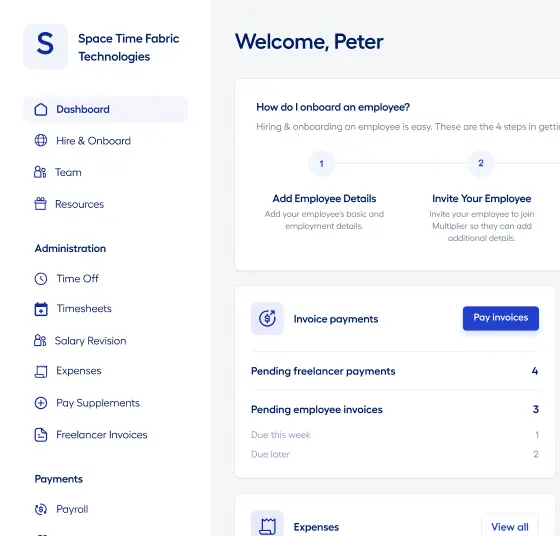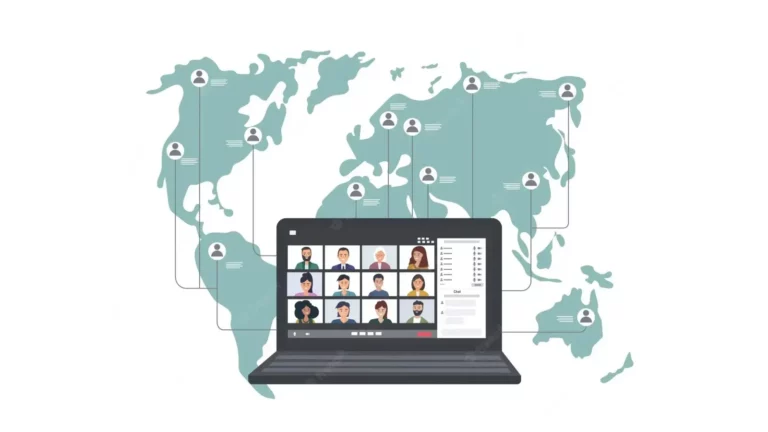“What employment laws apply to remote employees?”
This question often confuses entrepreneurs across the globe, especially the ones planning to set up a remote workforce.
Labor law compliance is one of the remote work challenges employers are still coping with. Hence, this guide on labor laws for remote employees is here to make things a little easier.
In this guide to remote employee laws, we’ll cover the labor laws for remote employees and several other questions about this topic.
What are Labor Laws for Remote Employees?
Labor laws or employment laws define the employer’s obligations regarding their employee’s security. The law serves as an outline to guard employees, be it on-premise, contract workers, or remote employees, against injustice or discrimination.
Labor laws include objectives like;
- The physical and mental well-being of employees
- Equal pay and opportunities
- Safety and welfare of employees
- Workplace diversity and inclusion
Non-compliance to any remote employee labor laws may lead to legal consequences for the employer.
Key Labor Laws to Consider When Hiring Remote Employees
When planning to build a remote workforce, employers must be aware of the labor laws for remote employees. Knowing the remote work laws makes compliance easier.
The Fair Labor Standards Act, 1938 or the FLSA is the governing federal labor law in the US.
Consider FLSA as the umbrella law established by the Department of Labor for the entire US. And then, there are state laws that vary according to the US state where the remote employees work from.
Now, remote employees can work from anywhere in the US. In that case, employers must consider and comply with the FLSA and the state labor laws for remote workers where the remote team operates from.
However, in some cases, employers need to comply with the remote employee labor laws of two states (if different) – one where the remote employee works from and the other where the organization’s headquarters are located.
Example – Suppose, a business is headquartered in New York and has remote employees across the country. This means that the employer needs to comply with different regulations for each employee. For instance, if the New York registered firm has a remote employee working from Chicago, it would have to comply with the Illinois labor laws for that employee.
However, there is an exception in this case for exempt employees.
According to the FLSA, exempt employees are not subject to overtime remuneration like Computer Systems analysts or Outside Sales Executives. No matter which city or state the exempt employees work from, the overtime laws would not apply.
Below are the categories of remote employee labor law employers must know about.
Minimum wage requirements
For non-exempt remote employees (those who work on an hourly basis), the employer must comply with the state minimum wage requirements law where the employee works from. However, if the federal, state and local minimum wage differ, the highest amount will apply to the employee.
Overtime requirements
For non-exempt remote employees, employers must comply with the federal overtime requirements.
As per the guidelines, employers must pay at least the minimum wage for the first 40 hours of the working week. For overtime, employees must be compensated 1.5 times their regular rate.
However, employers need not pay for unscheduled, unexpected hours that they are not aware of.
Payroll regulations
Coming to payroll regulations, there are a few different aspects of it. Further, differences in payroll requirements exist between states and localities. Hence, employers must know what regulations apply to their remote employees.
- Tax: Filing taxes as an addition to federal tax laws for remote employees
- Deductions: The mandatory payroll tax deductions, job-related expenses, and health insurance premiums.
- Payday: The payment frequency for employees – weekly, bi-weekly, monthly, or semi-monthly.
- Paystubs: The information on paystubs, like including paid sick leave accruals
- Delivery: The way employers deliver the paycheck.
Break regulations
US states like Illinois, Delaware, Connecticut, New York, Nevada, Minnesota, etc., require non-exempt employees to receive meals, rest, and lactation breaks.
The FLSA requires employers to pay for 20- minute breaks. Also, employees must be given 30 minutes break for meals. Meal breaks must be interruption-free, and employers cannot ask employees to be available for work during their meal breaks. If the meal break is interrupted, employers must pay for the entire meal period or provide the meal break later.
In addition to the remote working employment laws for a break, there may be state requirements.
Workers’ compensation
Even if your employees work remotely, they are eligible for workers’ compensation.
The lack of employer control over the employee’s working conditions is irrelevant here. This is because employers are considered responsible for providing employees with a safe working environment, regardless of where they work.
If a remote employee falls at home during teleworking, they may be eligible for workers’ compensation. It would depend on their sustained injuries (if any) that occurred during the employment period.
Based on the location of the company and the remote employee, employers must assess the coverage and claims.
Business expenses
Employers must reimburse a few specific business expenses to their employees. For instance, internet expenses for remote employees.
However, reimbursements do not mean that the pay for non-exempt employees must fall below the minimum wage limit. Employers must calculate the expenses related to business activities and reimburse the same.
For instance, if the employer reimburses for the internet, they will need to calculate expenses based on the internet used for business and not personal work.
Health and safety requirements
Even for remote employees, employers must consider health and safety regulations. They must create a safe and secure working environment. This means they must identify risks and hazards and take safety measures for employees.
Employers may create a health and safety policy that includes training and giving employees responsibilities to report any incidents and issues. Further, employers may also need to provide employees with protection equipment based on the type of work.
Discrimination and equal pay
The discrimination laws apply in the same way to remote employees as to on-premise employees. Employers must think about discrimination and equality as early as posting jobs and taking interviews.
In the US, a few places like;
- Washington
- Toledo, Ohio
- New York City
- Rhode Island
- Maryland
- Nevada
- Colorado
- Connecticut
- California and
- Cincinnati, Ohio
Requires employers to mention the compensation range from the beginning to ensure equal pay. Also, out of these states, the laws in a few states like Maryland, Cincinnati, California, etc., prohibit the employers from asking applicants about their compensation history.
Along with equal pay, employers must be careful about discrimination based on age, ethnicity, religion, gender, disability, nationality, or pregnancy. They must refrain from mentioning any of these aspects during an interview.
Employers must ensure equal opportunities for remote employees as on-premise ones. The remote employees must access the same training and responsibilities that give them equal chances for promotions or pay raises.
Lastly, employers must meet the demands of disabled employees (if any) requesting accommodations unless it causes much hardship. This may involve changing the work environment or processes to enable the employee to take up essential jobs.
Labor law postings
The FLSA requires employers to share labor law postings with employees. The necessity of these postings depends on how often the employees visit the organization’s office.
If the employees visit your office a minimum of three times a month, you need to display a labor law posting in the office with updated information prominently placed.
However, if your employees never visit the office and work remotely, you may send the postings via email. You can also mail hard copies if you have employees at remote worksites.
Employers may face the issue of different labor laws according to remote employee locations. Hence, it would be best to send them the labor law postings of the remote employee’s work location and the organization’s location. Also, keep the records of postings sent to employees and send them the latest updates (if any).
Immigration laws
Employers may hire non-citizens living in the US as remote employees. In this situation, employers must ensure that the candidate has proper authorization to work in the country.
The procedure involves mandatory filling out a Form I-9 to verify employment eligibility. You may also be required to use the E-Verify system.
Labor laws for international employees
Research regarding remote employee labor laws is necessary if you hire employees from other countries. Consider knowing the labor laws of the specific country where you hire remote employees from.
Here are a few key details that can help you choose countries wherefrom you want to hire your remote employees.
- India: The labor laws in India are complex, but only a few apply to contract employees. However, employers are required to protect contract employees from discrimination. In the case of taxes, both the employer and the employees are responsible.
- The European Union (EU): In the EU, employers can negotiate a contract with employees for a fixed term. Employers must comply with the laws to keep employees’ data safe, offer equal compensation, and prevent discrimination. The other laws may differ according to the EU countries.
- China: Labor laws in China are minimal. Hence, it is easy to hire remote employees from the country. The requirements are flexible, and the employees are entirely responsible for taxes. However, employees need to ensure that they follow the employment process by filing proper contracts with the government.
Manage your Remote Workforce Labor Laws with Multiplier
Complying with the labor laws for remote employees can be difficult, especially when the laws differ by state and country. Also, the remote work laws are subject to change over time.
Entrepreneurs need to keep up with the labor law updates and the changing regulations. Additionally, they must ensure that the business operates legally.
With so many aspects to look after, it is easy for employers to get stressed. But with platforms like Multiplier, complying with remote employee labor laws can be easier.
Multiplier ensures smooth set-up and management of the remote workforce across different countries. It can help you with employment contract generation, multi-country payroll, multi-currency payments, and, most importantly, legal compliances.
Further, Multiplier’s EOR solution can enable your organization to hire and engage with overseas employees efficiently without setting up a local entity. In short, Multiplier can serve as the legal employer for your employees.
To know more about the platform, book a demo now!







